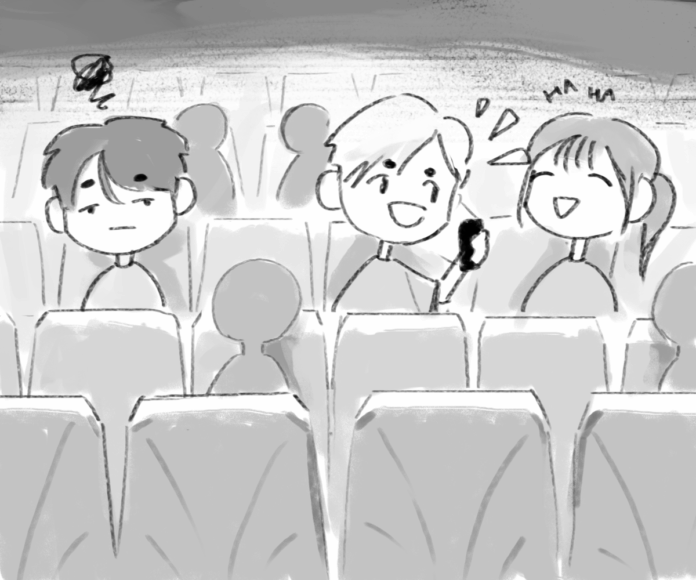Reflecting back upon past years where box office success coincided with disruptive audiences
By BELLA PETERSON — [email protected]
Box office hits aren’t a new thing for theaters. Success for movies, however, has recently changed meanings and now represents its presence online more than anything else. With our pop culture being determined predominantly by social media, it’s no surprise that present-day movies’ online reception can be make or break. It seems, lately, that social media hasn’t just affected these movies online but has now evolved to feature viewer reactions in theaters.
Back in 2021 with the release of “Spider-Man: No Way Home,” the theaters were filled to the brim with audiences eager to see this newest installment. The film gained most of its exposure from the rumors and leaks that had spread online like wildfire — excitement was erupting from the fans as they realized that some of their favorite past portrayals of “Spider-Man” characters would be making a return. Initially wholesome, the amount of fans that were joining together for this pivotal moment in “multiverse” history quickly turned obnoxious.
The first days of the film’s release saw dozens of theaters packed with fans reacting — to put it lightly — inappropriately to the screening. Clips went viral on social media platforms of fans erupting in cheers in their screenings of the movie. But this isn’t just about cheering fans; some screenings also saw fans throwing their popcorn, jumping up from their seats, doing backflips in front of the screens and even breaking out into fights. Fans’ reception to this movie was clearly positive — but was it okay?
The issue of theater etiquette boils down to one main thing: What is the purpose of going to see a movie in theaters? No one is forced to view a movie in theaters; The option of waiting until the film is released on streaming services — which is usually only a month or so — is always available.
However, the experience of going to the theater to see a movie doesn’t just come down to watching a film — it’s the feeling of being fully immersed into a project that so many people poured their heart into. Live reacting alongside strangers to unexpected twists and turns that the movie makes, whether it be crying together or laughing together, is a shared moment meant to foster a sense of community.
There was a similar situation with the newly released “A Minecraft Movie.” Even before the release of the movie, many users flocked to social media as early as the movie’s first trailer to tease it; in a way, making their own inside jokes on the platform. Similar to the uproar that “Spider-Man: No Way Home” caused, “A Minecraft Movie” had cultivated a very unique impression by audiences before it hit the theaters.
The movie climbed its way to a very impressive position on the opening weekends’ ranking. Along with this success came a closely related audience reaction to “Spider-Man: No Way Home” — with loud reactions in the theater of clapping, yelling and cheering, to name a few. One theater even had its very own live chicken brought to the cinematic experience.
What matters is: Does this affect the cinema going experience? If a person finds themself in the same boat as most of the online population of being excited for a movie, do they have to worry about that experience being tarnished by a disruptive audience? Do people even care?
It seems that online reactions are mixed when it comes to this issue: some finding the feeling of community in being able to react alongside other people in a loud manner while others find it annoying to have to pay for an experience where they might not be able to fully enjoy the film.
The concept of “theater etiquette” isn’t as commonly talked about as related topics like “concert etiquette,” but it is something that does exist — or rather “should” exist. Most movies feature a disclaimer before the screening that highlights behavioral expectations, requesting that the audience silence their devices and remain quiet during the movie. Spoiler alert, this isn’t present for no reason. The audience is told this for a purpose: to preserve the movie-watching experience.
Whatever displeasure anyone may express regarding this issue seems to go unheard; this isn’t an isolated event and it will keep happening. And these aren’t the only issues that theater etiquette faces. Is theater etiquette dead? It just may be on its last legs; It’s hard to solve something that not everyone can agree is a problem.
All that can be done for now is to remain considerate. If someone chose to view a movie in their local theater, they might want to first consider the other theater-goers in the audience who have paid for the same experience, along with the theater’s employees who will have to pick up after whatever mess gets left behind.
Going to the theater to see a movie you have been waiting for is a truly special thing and is honoring the practice of viewing a movie in its truest form — maybe it’s something more people should consider before they take it for granted.
Written by: Bella Peterson — [email protected]





